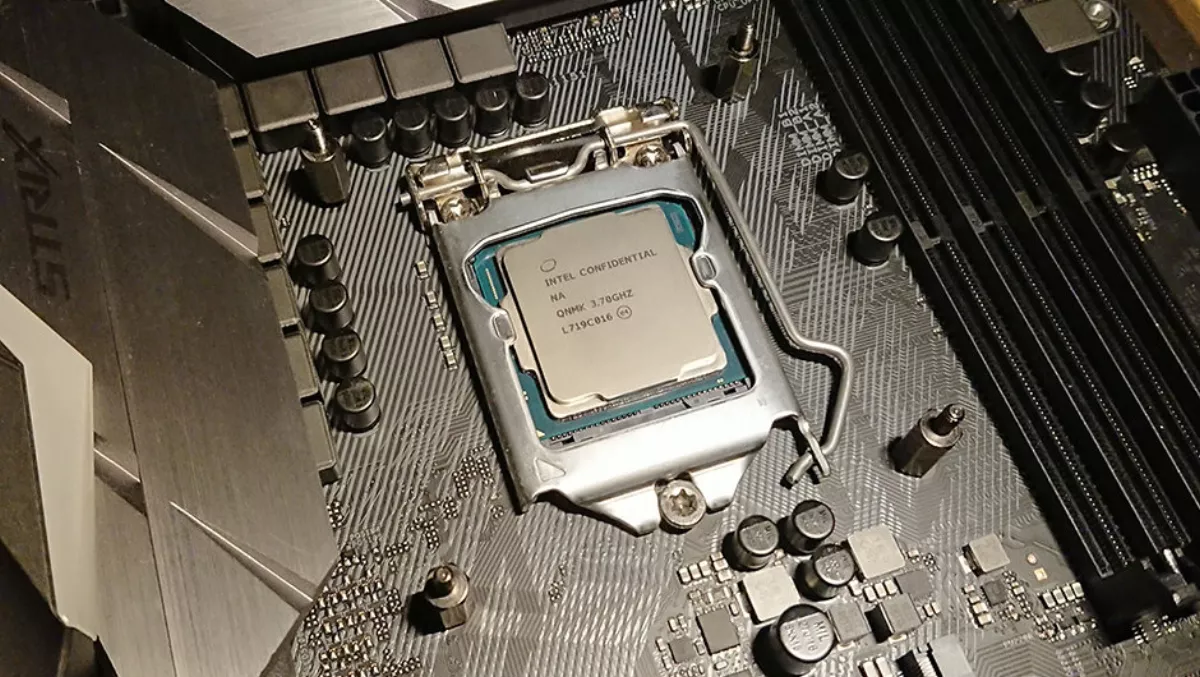
Hands-on review: Intel Core i7-8700K
Is upgrading to Intel's 8th generation of CPUs a worthwhile investment? FutureFive's Darren Price takes a look at the Intel Core i7-8700K.
It's been a year since I road-tested Intel's 7th generation Core i7-7700K Kaby Lake CPU. The chip has been running the whole time with its four cores overclocked to 4.8GHz (from 4.5GHz), without issue
So, what about Intel's Core i7-8700K? Is it worth the upgrade?
The Coffee Lake 8th generation 14nm CPUs smell a lot like a retooled Intel's 7th gen 14nm Kaby Lake CPUs. Like the Kaby Lake and the 6th gen Skylake CPUs, the Core i7-8700K uses an LGA1151 motherboards socket. But, whereas a Kaby Lake CPU would happily run in your Skylake Z170 motherboard, Coffee Lake CPUs need a motherboard with an Intel 300-series chipset. If you want to really mess about with a Core i7-8700K CPU you also need to invest in a Z370-based motherboard.
To test the i7-8700K I'm using an Asus Republic of Gamers STRIX Z370E Gaming motherboard. As it's is essentially the same as the STRIX Z270F that I used in my previous build, I'm just going to swap them out. No reinstalling Windows or the like.
The Asus Republic of Gamers STRIX Z370E Gaming motherboard features ROG's easy-to-use BIOS, allowing novice and advanced overclockers, alike, to get the most out of their set-up. With a sensible cooling solution, you are, pretty-much, guaranteed a decent performance boost with only a few clicks.
As the 8700K looks identical to a 7800K and uses the same socket, your existing cooling solution can be reused as part of the upgrade. The CPU also uses DDR4 memory so, as long as you've not been scraping by with DDR3 (which you should have replaced at the same time as you purchased your last CPU), you can insert your existing memory into the new motherboard.
An Intel Core i7-8700K has a base clock speed of 3.7GHz and a turbo clock speed of 4.7GHz. Compare that to an i7-7700K, which has a base clock of 4.20GHz and a turbo of 4.50GHz, and there really isn't that much of a difference. In fact, the newer CPU's base clock is lower.
The main difference between an i7-7700K and an i7-8700K is that the 8700K has six cores rather than five. Theoretically it has a third more processing real estate, running in turbo at 0.2GHz faster than an i7-7700K. Practically-speaking it depends on what software you are running. By the way, it's these extra cores that require the improved power distribution of the new Intel 300 series motherboards.
If you do video or image editing, 3D rendering or any other processor-intensive activities, chances are the software is design to scale-up and use as many of the cores as possible (it is actually hyperthreading, with the i7-8700 having twelve treads over the 7700's eight). For gamers, it's been slow, but there are titles starting to use more core than four cores. The likes of Ghost Recon Wildlands, Battlefield 1, and Forza Horizon 4 all, to some degree, utilise all twelve threads of the Core i7-8700K.
What about those CPU clock speeds? I wouldn't worry about the 3.7GHz base speed. There's nothing wrong with the CPU chilling out at 3.7GHz whilst you browse the Internet or work on spreadsheets. The 4.7GHz, well, we can do something about that.
The "K" suffix of the i7-8700K means that the CPU is not multiplier locked. The short explanation is that it is easy to increase the CPU's performance by overclocking. The speed that the CPU runs is determined by the BLK frequency (which we used to call the front side bus speed,) i.e. the frequency that the motherboard sends info to all the components (usually 100MHz), multiplied by another figure (the clock multiplier). For instance, the i7-8700K's turbo speed is determined by the product of a BLK of 100MHz and a multiplier of 47 to get 4.7GHz.
If the multiplier is locked (as in the non-K suffixed Intel CPUs), in order to get extra speed you'll likely need to raise the BLK from 100MHz to something else. The side-effect of this is that you will overclocking all of the components plugged in your motherboard as well as the CPU. That's a lot of components to potentially cause problems (and/or damage). It's much easier to increase the multiplier value until things get messy and them bring it down a notch.
The Asus Republic of Gamers STRIX Z370E Gaming motherboard take a lot of the pain out of this by automatically applying the overclock. The board did still try an unnecessary 103MHz BLK, which I changed back to 100MHz. For the multiplier, I had no problems running at 50, overclocking the i7-8700K to 5GHz -which isn't bad. With a bit more patience I reckon it would go further, but 5GHz is a good speed without needing too much cooling and whirring fans.
Whilst the 7th Gen Core i7-7700K is still a superb CPU, the i7-8700K with its extra cores and better overclocking capabilities make it worth looking into as an upgrade. The need for a new motherboard, adds to the cost, but you should be able to reuse your cooler and RAM. For many the i7-8700K will not offer enough extra grunt as an upgrade solution from an i7-7700. But if you are into high-end gaming or professional graphics applications, every bit of performance counts and those extra cores are going to make a difference.
If you are looking at a new PC build to enjoy playing the latest games and perhaps a bit of video editing, I'd also recommend an Intel Core i7-8700K. Not only will you benefit from the performance of a top-class CPU, you are likely to get a good few years use out of it as well.


